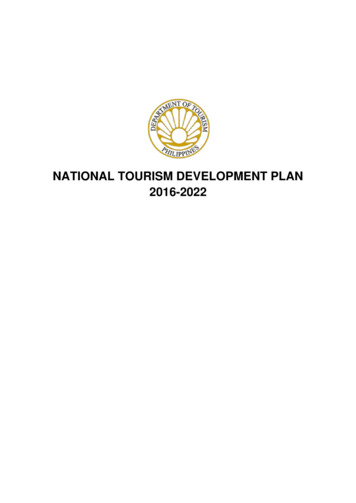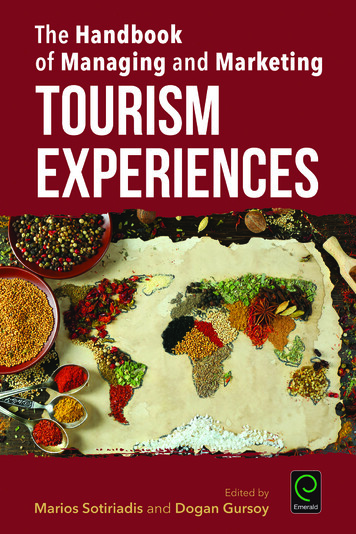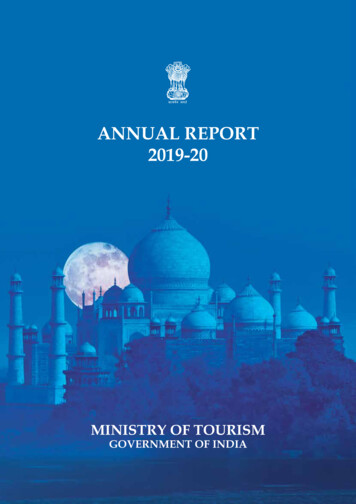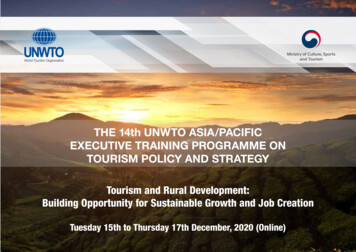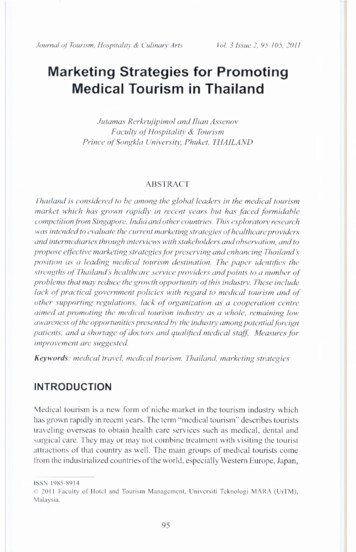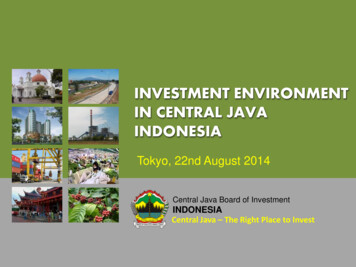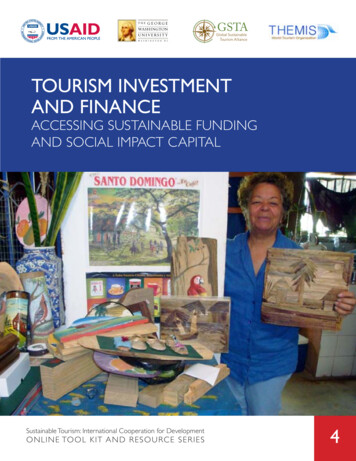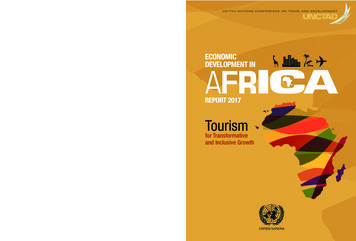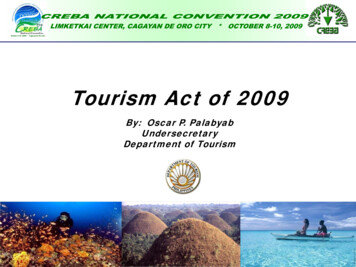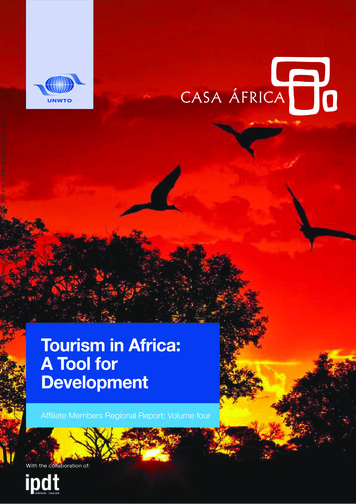
Transcription
9284417322 - Tuesday, September 03, 2019 4:31:21 AM - IP Address:62.97.100.84Tourism in Africa:A Tool forDevelopmentAffiliate Members Regional Report: Volume fourWith the collaboration of:
9284417322 - Tuesday, September 03, 2019 4:31:21 AM - IP Address:62.97.100.84
9284417322 - Tuesday, September 03, 2019 4:31:21 AM - IP Address:62.97.100.84Affiliate Members Regional Reports,Volume four – Tourism in Africa:A Tool for Development
9284417322 - Tuesday, September 03, 2019 4:31:21 AM - IP Address:62.97.100.84Table ofcontents1.2.3.4.Foreword by UNWTO Secretary-General2Foreword by Casa África General Director3Message from the Director of the Affiliate Members Programme4Message from the Director of the Regional Programme for Africa5Executive summary6INVESTOUR14Introduction17African tourism – current situation and future prospects18African tourism: current situation and future prospects18Trends and recent performance in African tourism20Future outlook25Tourism product development – key concepts and destination context26Tourism product development: key concepts and destination context26Variables influencing tourism product development30The role of destination authorities in tourism product development31Fundamentals and principles of tourism product development34Aspects to put in place before effective tourism product development34Principles and procedures of tourism product development35Steps in the process37Prioritizing the destination’s tourism product development objectives38A methodology for tourism product development in Africa42The model destination42UNWTO prototype methodology for tourism product development45
9284417322 - Tuesday, September 03, 2019 4:31:21 AM - IP Address:62.97.100.845.Best practices in tourism product development and destination success in Africa52Case studies:Kenya:Transformative tourism for our sustainable future56Cape Town:Tourism Product Innovation in Cape Town58Kenya:Solid waste management at Kicheche Laikipia Camp60Morocco:The untapped tourism potential in Africa63Africa:African aviation set for lift-off66Tanzania:Eco friendly sustainable camp68Africa:The Africa tourism monitor report 201470South Africa:Enterprise development programme72Kenya, Tanzaniaand Uganda:Potential of cultural attractions as Counterbalance and/or Enrichment of theexcessively promoted safari programmes74Africa:The importance of Tourism SMEs for sustainable tourism development in Africa77Kenya:Protecting livelihoods and enhancing the visitor experience on Mombasa’s north coast80Africa:The sustainable tourism certification Alliance Africa (The Alliance)83Africa:The high-end tourism market: a local luxury86Senegal:The cultural heritage of the Island of Gorée as a tourist resource90Tanzania:Natural resource management and stakeholder conflict92Africa:The march of the hotel chains94Kenya:Inclusive profitable tourism in Western Kenya98Zimbabwe:Product diversification in Zimbabwe: a look at religious tourism101Angola:Developing skills in the Angolan public tourism sector104List of figures and tables108Reference109
9284417322 - Tuesday, September 03, 2019 4:31:21 AM - IP Address:62.97.100.84Forewordby Taleb Rifai,Secretary General,World TourismOrganization(UNWTO)Tourism is one of the Africa’s most promising sectors in terms of development. In2014, Africa received 56 million international tourists up from 26 million in 2000.International tourism receipts amount to US 36 billion or 7% of all exports in thecontinent.Africa has a major opportunity to harness the potential of tourism to foster developmentand increase its participation in the global economy. In addition, tourism createsopportunities for millions of host communities in Africa and provides revenues forcultural and environmental preservation.Creating capacity in Africa to develop and manage a competitive tourism offeris thus fundamental. Tourism products are a key pillar in the development of anytourism destination. The range and quality of the tourism product offering defines thecompetitiveness and attractiveness of tourism destinations and the visitors’ experience.As tourism to Africa evolves to become an increasingly important socio-economicsector, it is essential for countries in the region to adopt effective strategies fortourism product development; strategies than promote a more competitive Africatourism offer in the marketplace and comply with the need and desires of prospectvisitors. UNWTO Regional Programme for Africa and UNWTO Affiliate MembersProgramme joined forces, with the support of Casa África, to develop the presentreport, which aims to provide African destinations with the appropriate tools andtechniques to assist them in increasing their competitiveness in the current rapidlychanging marketplace.On behalf of UNWTO, I would like to extend our gratitude to all organizations andMember States that have contributed to this report. I trust it will serve as a usefulinstrument to advance tourism in Africa, recalling that the development of adequateand sustainable tourism products can only be achieved through the cooperativeefforts of all parts of the tourism value chain – national and local governments, theprivate sector and civil society – geared towards an holistic tourism experience.2UNWTO AM Regional Report: Volume Four
9284417322 - Tuesday, September 03, 2019 4:31:21 AM - IP Address:62.97.100.84Forewordby Luis Padrón López,General Director ofCasa ÁfricaCasa África is a public consortium under the auspices ofthe Ministry for Foreign Affairs and Cooperation in Spain,with active participation on the part of the AutonomousGovernment of the Canary Archipelago and the TownCouncil of Las Palmas de Gran Canaria, the city where theheadquarters are based. Our work is to design and set inmotion activities of public diplomacy in the fields of economicsand culture to bring Spain closer to Africa and vice versa,both at the level of public institutions and at grassroots.Some six years ago, Casa África began a process ofcollaboration with UNWTO and FITUR, the InternationalTourism Fair in Madrid, (Feria Internacional de Turismode Madrid) to set up INVESTOUR, a professional rendezvous where Africa is put on the map of world tourism. Theaim is simple: to get private and public ventures in Africaconnecting and networking not only with Spain but alsowith the rest of the world.Spain’s know-how in the field of tourism development isunchallenged. Some of the leading names in world tourismdevelopment and innovation are Spanish, and thus can beof great aid to our colleagues in Africa.Our excellent relations with UNWTO Regional Programmefor Africa have led us to cement this initiative. In 2014alone, Africa attracted over 56 million tourists, 5% ofthe total tourist movement that year. Although things areimproving, the numbers are still far from the contributionto the GDP in each of the different nations that tourismcan bring.Both of our organisations lament the dearth of specificallyprofiled publications that would allow us to build up, yearafter year, a truer picture of what tourism means and couldmean to the African continent, together with the bestpractices that emerge as guidelines for African countriesto follow. This document is designed to change all that.Spain is convinced that tourism is the way ahead forgrowth in the whole of the African continent, much as hasbeen the case for Spain (visited by 65 million tourists in2014). Such was the opinion voiced by the Secretary forTourism in the latest edition of INVESTOUR.As can be seen from this report, the expectations couldhardly be greater. In less then 15 years, it is hoped thattourist figures will more than double from the 56 million atpresent, in the whole of the continent, to 130 million.The goal is clear. Now we have to pave the path towardachieving it. We have to ensure that growth in tourismwill really make a palpable difference and will promoteinclusive economic growth, for the sector to make a visibleand tangible impact on all of the African countries.We hope here to be laying the foundation stones uponwhich to build the dream of a future: a future where all theAfrican countries will prosper from the economic growthpropitiated by tourism.UNWTO Tourism in Africa: A Tool for Development3
9284417322 - Tuesday, September 03, 2019 4:31:21 AM - IP Address:62.97.100.84Public-privatepartnerships inAfrica: a tool fordevelopmentThepotentialofAfrica’stourism remainslargelyuntapped. UNWTO Tourism Highlights 2015 Editionreports that the African region receives only a 3% sharein tourism receipts and a 5% share in worldwide arrivals.If developed effectively, tourism has the potential toaccelerate Africa’s economic growth and job creation. Thesector also has the capacity to contribute significantly tothe agenda for social inclusion, as cultural endowmentsand natural assets can be leveraged to create opportunitiesfor local communities.Despite the challenges impacting the image of Africa, aproper product development plan will help mitigate theproblem and enhance the tourism experience within theregion. However, the success of any tourism productcannot be achieved without the participation of all publicand private stakeholders. It should involve the activeintervention of various government departments andentities together with private sectors.Against this backdrop, the Affiliate Members Programmeof UNWTO is pleased to present the next volume ofAM Regional Report, produced in partnership with theUNWTO Regional Programme for Africa and our AffiliateMember Casa África. This Report takes a closer look atthe links between tourism product development and itsdirect application in Africa to provide structural knowledgefor the stakeholders. Its relevance lies in its existingbest practices, challenges and future opportunities as4UNWTO AM Regional Report: Volume Fourillustrated through case studies provided by our valuedcontributors.The case study contributions included in this report havedemonstrated various initiatives implemented to fostercontinued growth in African tourism. Topics featured inthis Report include increased mobility for visitors, humanfactor as the basis of tourism development, and aviation skey role in tourism development.We are confident that this Report will facilitate the widerdissemination of knowledge and tools among stakeholdersin the field to enhance sustainability in tourism. We hopethis will be the beginning of even greater collaborationbetween public and private entities in our efforts toincrease information and enhance the quality of thetourism sector in Africa.Finally, I would like to thank all the UNWTO AffiliateMembers who have participated in this Report, namelyIPDT, Cape Town Tourism, IATA, ISITT, RussianInternational Academy for Tourism and the University ofBologna for their engaging and insightful commentaries.I would also like to thank Casa África for their expertise,support and contribution in this initiative.Yolanda PerdomoDirector of the Affiliate Members ProgrammeWorld Tourism Organization (UNWTO)
9284417322 - Tuesday, September 03, 2019 4:31:21 AM - IP Address:62.97.100.84Developingtourism in AfricaAcross the globe, Tourism has evolved as one of themost expansive, diverse and sectors of our times. Nowrepresenting one of the largest and fastest growing economicsectors in the world, Tourism contributing 9% of global GDP.Importantly, supporting the livelihoods of 1 in 11 peopleworldwide, the sector has become a source of immenseopportunity and possibility.Destinations recognising the ability of the sector to transformnations economically, socially and environmentally, andtherefore investing in the sector, have enjoyed significantprogress, thus demonstrating tourism’s role as an essentialtool leading to the development, prosperity and well-beingof a country s economy. In Africa, Tourism continues toenjoy sustained growth. In 2014, the continent welcomed56 million international tourists from 26 million in 2000.International tourism receipts increased by US 1 billion lastyear, reaching US 36 billion and accounting to 7% of allexports in the continent.The African continent is truly adorned with a rich diversity, anabundance of untouched resources, natural beauty, culturalheritage and historical sites, wildlife, safaris, beaches,deserts and much more that, if channelled correctly, couldprovide considerable opportunities for cultural tourism, ecotourism, adventure tourism and diaspora tourism.Despite the above, progress remains unequally distributed.The Northern and the Southern regions of Africa enjoy themajority of tourism arrivals, whereas the balance of the regionrecords less modest increase. That said, it is well understoodthat the tourism potential in Africa remains untapped, withthe possibility to continue to positively, meaningfully andsustainably impact the economy of the continent, acting as acontributor to development, economic growth, employmentopportunities, poverty alleviation, investment opportunitiesand infrastructure development.Looking to the future and the potential of Tourism on thecontinent, UNWTO forecasts shows that by 2030 the numberof international arrivals in Africa is expected increase bymore than a double, growing from 50 million to 134 million,increasing the global market shares of Africa to 7%. Centralto unlocking the potential of Tourism in Africa is the joining ofhands of partners that share a fundamental confidence in,and commitment to, Tourism on the continent.UNWTO is honoured to have created this report on tourismdevelopment in Africa with a number of our valued partners.A special expression of gratitude goes to Casa Africa, a pillarin unlocking growth potential on the continent. In addition,our thanks is extended to our UNWTO Affiliate Memberswho participated in the creation of this report, offeringinvaluable insight and intelligence on this important area ofAfrica’s growth potential. And a warm thanks is extended toour UNWTO Members from across Africa, the championsof Tourism across the continent. As Africa’s future unfolds,the continent will no doubt be stronger, as a rich array ofdestinations, and as one united community, all because ofwhat Tourism will bring to Africa.Elcia GrandcourtDirector of Regional Programme for Africa,World Tourism Organization (UNWTO)UNWTO Tourism in Africa: A Tool for Development5
9284417322 - Tuesday, September 03, 2019 4:31:21 AM - IP Address:62.97.100.84ExecutivesummaryScope of StudyPortée de l’étude–This study was commissioned by the World TourismOrganization (UNWTO) with the support and closecooperation of Casa África to assess the currentsituation of Africa’s tourism product development.–Cette étude a été commandée par l’Organisationmondiale du tourisme (OMT) avec le soutien et l’étroitecollaboration de Casa África pour faire le point sur ledéveloppement de produits touristiques en Afrique.–It proposes a UNWTO methodology for tourismproduct development that can be applied to Africandestinations.–Il y est proposé pour le développement de produitstouristiques une méthodologie de l’OMT qui peuts’appliquer aux destinations africaines.–Recent tourism performance across Africa is analyzedand future prospects are identified, thus demonstratingthe importance of a well-defined strategy for tourismproduct development, so as to explore and leveragethe array of opportunities that the international tourismsector offers to African destinations.––It further discusses the prospects and challenges oftourism development for African nations, describesa specific approach for developing unique tourismproducts and presents case studies of specific projectsthat are helping shape Africa’s tourism context.Le document comporte une analyse des résultatsrécents du tourisme à travers l’Afrique et un recensementdes perspectives d’avenir, qui mettent en évidencel’importance d’une stratégie de développement deproduits touristiques bien définie pour pouvoir exploreret exploiter les multiples possibilités que le secteurdu tourisme international ouvre aux destinationsafricaines.–Il y est également question des perspectives et desenjeux que présente le développement du tourismedans les pays d’Afrique, avec la description d’uneapproche spécifique pour la mise au point de produitstouristiques originaux, et la présentation d’études decas sur des projets précis qui aident à dessiner lecontexte touristique de l’Afrique.6UNWTO AM Regional Report: Volume Four
9284417322 - Tuesday, September 03, 2019 4:31:21 AM - IP Address:62.97.100.84 Kierran Allen Dreamstime.com.Africa’s tourism - current situation and futureprospectsLe tourisme en Afrique – situation actuelle etperspectives d’avenir–Africa has been one of the world s fastest growingtourism regions, growing a small base of just14.7 million visitors in 1990, to 26 million internationaltourists in 2000 and 56 million in 2014.–L’Afrique est une des régions du monde où le tourisme aconnu les plus fortes croissances, partant d’une faiblebase, de seulement 14,7 millions de visiteurs en 1990,pour grimper à 26 millions de touristes internationauxen 2000 et à 56 millions en 2014.–International tourist arrivals in Africa are estimatedto have increased by 2% in 2014. In absolute terms,the region welcomed a total of 56 million internationaltourists.–Selon les estimations, le nombre d’arrivées de touristesinternationaux en Afrique a augmenté de 2 % en 2014.En valeur absolue, la région a accueilli au total 56millions de touristes internationaux.–Cette hausse de 2 % représente toutefois un netralentissement de la demande touristique après desannées d’une croissance soutenue.–Les recettes du tourisme international ( 3 %) ont crûd’un milliard de dollars EU pour atteindre 36 milliards.La région a maintenu à 5 % sa part des arrivées dansle monde et à 3 % sa part des recettes touristiques.–En Afrique du Nord ( 1 %), les arrivées de touristesinternationaux dans la première destination, le Maroc,ont progressé de seulement 2 %, après avoir affichéun très bon résultat l’année précédente, tandis que lafréquentation en Tunisie a fléchi de 3 %.–Selon les estimations actuelles, l’Afrique subsaharienneaurait enregistré une hausse de 3 % en 2014.–––Africa’s 2% rise however represents a clear slowdownon tourism demand after years of solid growth.International tourism receipts ( 3%) increased byUS 1 billion to reach US 36 billion. The regionmaintained a 5% share in worldwide arrivals and a 3%share in tourism receipts.In North Africa ( 1%), international tourist arrivals inleading destination Morocco grew by a modest 2%,following a strong performance in the previous year,while arrivals in Tunisia decreased by 3%.–Sub-Saharan Africa grew by an estimated 3% in 2014,based on available information–Arrivals to the sub region’s largest destination SouthAfrica ( 0%) were flat in 2014. Worth mentioning amongUNWTO Tourism in Africa: A Tool for Development7
the other destinations for which data is reported areCôte d’Ivoire ( 24%), Madagascar ( 13%), Mauritius( 5%), Zimbabwe ( 3%) and the Seychelles ( 1%). 9284417322 - Tuesday, September 03, 2019 4:31:21 AM - IP Address:62.97.100.84––––While many countries in Africa benefited fromstrong economic growth in their tourism sector, thecontinent s share of worldwide tourism receipts isrelatively modest.La courbe des arrivées dans la plus grande destinationde la région, l’Afrique du Sud ( 0 %), est restée plateen 2014. Parmi les autres destinations pour lesquelleson possède des chiffres, la Côte d’Ivoire ( 24 %),Madagascar ( 13 %), Maurice ( 5 %), le Zimbabwe( 3 %) et les Seychelles ( 1 %) méritent une mention.–Tourism creates jobs and stimulates SME (Smalland Medium Sized Enterprise) growth. In 2014 itrepresented 9% of world GDP - direct, indirect andinduced impact.Si le secteur touristique de nombreux pays d’Afriquea profité d’une forte croissance économique, la partdes recettes touristiques mondiales qui revient aucontinent est relativement modeste.–Tourism is one of the fastest growing sectors ofthe world economy. International tourism has shownalmost uninterrupted growth since the 1950s and hasalmost doubled over the past decade.Le tourisme crée des emplois et stimule lacroissance des PME (petites et moyennesentreprises). En 2014, il a représenté 9 % du PIBmondial – effets directs, indirects et induits.–Le tourisme est un des secteurs les plusdynamiques de l’économie mondiale. Le tourismeinternational affiche une croissance quasi ininterrompuedepuis les années 1950 et a presque doublé au coursde la dernière décennie.–Le tourisme semble particulièrement prometteurpour les pays en développement. Le tourisme croîtplus rapidement dans les régions émergentes et endéveloppement de produits touristiques que dans lereste du monde.–Le tourisme accélère les réformes. Le tourisme estune source d’inspiration pour les politiques favorablesaux entreprises et les réformes qui peuvent aider ledéveloppement de produits touristiques des PME etstimuler l’investissement.–Tourism shows particular promise for developingcountries. Tourism is growing faster in the world’semerging and developing regions than in the rest ofthe world.–Tourism accelerates reform. Tourism is a beaconfor pro-business policies and reforms that can helpSME development and stimulate foreign investment.Tourism product development – key conceptsand destination context–Tourism product development is a process whereby theassets of a particular destination are molded to meetthe needs of national and international customers.–The tourism product can include natural or man-madeattractions, hotels, resorts, restaurants, theaters,activities, festivals and events or a portfolio of thingsfor visitors to see and do.–Tourism product development is not an activityundertaken in a vacuum, but is part of an extensiveand inter-related process.–Market research, product development and marketingrepresent a continuum. The failure to deliver any ofthese key components will result in the destinationunder-realizing its potential.–As tourism provides opportunities for SMEs (smalland medium enterprises) many governments provideincentives to encourage the tourism product development.8UNWTO AM Regional Report: Volume FourDéveloppement de produits touristiques –concepts de base et contexte des destinations–Le développement de produits touristiques est unprocessus par lequel les atouts d’une destinationparticulière sont modelés de manière à satisfaire lesbesoins des clients nationaux et internationaux.–Le produit touristique peut inclure des élémentsnaturels ou artificiels, des hôtels, des complexestouristiques, des théâtres, des restaurants, desactivités, des festivals et autres manifestations, ou unensemble de choses à voir et à faire pour les visiteurs.–Le développement de produits touristiques n’est pasune activité menée en vase clos mais s’inscrit dans unprocessus large dont les éléments sont liés entre eux.
9284417322 - Tuesday, September 03, 2019 4:31:21 AM - IP Address:62.97.100.84––Some attractions or facilities are included in tourismdevelopment policies with plans increasingly gearedto meet specific socio-economic objectives. Theseobjectives can be as varied as attracting inward foreigninvestment, generating local level economic impactsin the form of SMEs and/or community tourism,boosting economic development in certain regions ofthe destination or reducing the seasonal imbalance tominimizing damaging environmental or socio-culturalimpacts on the destination and its resident population.–Les études de marché, le développement de produitset le marketing représentent un continuum. Faute delivrer l’une quelconque de ces composantes clés, ladestination sous-exploitera son potentiel.–Le tourisme offrant des débouchés aux PME, denombreux gouvernements utilisent des moyensd’incitation pour encourager le développement deproduits touristiques.–Certains lieux ou certaines installations sont intégrésaux politiques de développement du tourisme selondes plans de plus en plus guidés par des objectifssocio-économiques précis. Ces objectifs peuventêtre très variés : attirer des investissements étrangers,produire des retombées sur l’économie locale sous laforme de PME ou d’un tourisme communautaire, doperle développement économique dans certaines régionsde la destination ou réduire les variations saisonnièrespour limiter les dommages environnementaux ou lesrépercussions socio-culturelles dans la destination etchez ses habitants.–Une autre raison pour laquelle les autorités d’unedestination soutiennent le développement de produitstouristiques est la volonté d’améliorer l’offre d’équipementspour que la population locale puisse en profiter elle aussiet ainsi jouir d’une meilleure qualité de vie.Another significant reason why destination authoritiessupport tourism product development is to improvethe provision of facilities so that the local populationcan also enjoy, thereby improving their quality of life.Fundamentals and principles of tourismproduct development–––Three fundamental issues for which all destinationauthorities should consider which are the cycoordination and establishing a planning system andprocess to include the state, private sector and thecommunities where tourism takes place.Product development must be in line with the tastesand trends of the market which is subject to a rangeof influences such as marketing and promotionalcampaigns.The tourism product development strategy dependson the nature of resources available, whether it’s aflagship attraction or a cluster of minor attractions.Éléments fondamentaux et principes dudéveloppement de produits touristiques–Les autorités de toutes les destinations doivent prêterattention à trois points fondamentaux, qui sont lastructure interne des organisations, la coordinationgouvernementale inter-institutions, et l’établissementd’un système et d’un processus de planification quiintègrent l’État, le secteur privé et les collectivités oùse situent les activités touristiques.–The use of festivals and other mega events is analternative strategy that attracts visitors to a destinationwhich may not have any significant attraction or duringlow seasons.–There are steps in the planning process to discover thepotential for tourism product development and turningthe opportunities into successful developments thatmeets the market demands.–Le développement de produits doit être adapté auxgoûts et tendances du marché, lequel est soumis àtoutes sortes d’influences comme les campagnes demarketing et promotionnelles.–This process involves three stages of establishingthe present situation, identifying the opportunities fordevelopment and prioritizing the destination s tourismobjectives.–La stratégie de développement de produits touristiquesdépend de la nature des ressources disponibles,selon que l’on a affaire à une attraction phare ou à unensemble d’attractions de second rang.–L’organisation de festivals ou d’autres grandesmanifestations constitue un recours pour attirer desUNWTO Tourism in Africa: A Tool for Development9
9284417322 - Tuesday, September 03, 2019 4:31:21 AM - IP Address:62.97.100.84–There are tools that aid in the process of analyzingnamely, PEST1 analysis, SWOT2 analysis, TALC 3analysis, Ansoff matrix and the BCG4 matrix.–After identifying the destinations competitive positionand its possible future development and directions,the destination can identify the possible priorities ofthe products they seek to develop as it relates to theeconomic and socio-economic benefits.visiteurs dans une destination qui ne présente peutêtre pas beaucoup d’intérêt pendant la basse saison.–Le processus de planification se déroule en plusieursétapes qui permettent de découvrir le potentiel quiexiste pour le développement de produits touristiqueset de mettre à profit ces possibilités pour répondre à lademande du marché.–Le processus se compose de trois étapes : faire lepoint sur la situation en vigueur, définir les possibilitésde développement et hiérarchiser les objectifs de ladestination en matière de tourisme.–Certains outils peuvent faciliter le processus d’analyse,notamment l’analyse PEST1, l’analyse SWOT2, l’analyseTALC3, la matrice Ansoff et la matrice BCG4.–Après avoir déterminé sa position concurrentielle ainsique ses perspectives d’avenir et son évolution future,la destination pourra définir la priorité éventuelle desproduits qu’elle a l’intention de développer par rapportà leurs retombées économiques et socioéconomiques.A methodology for tourism productdevelopment in Africa––There are certain key principles in the process of tourismproduct development planning that can be illustratedthrough what might be called ‘a model destination’.This may not relate to any specific destination but isdrawn in such a way that many destinations can sharesome, if not several of the characteristics which mightdefine the model.The model destination is characterized by beingin the growth phase of the Tourism Area Lifecyclefacing issues of broadening both its product andmarket mix; being helped through a good level ofgovernment support but; hampered by limitations bothon manpower and financial resources; and concernsabout environmental and socio-cultural impacts inparts of the destination.–There is also a broad
Kenya: Solid waste management at Kicheche Laikipia Camp 60 Morocco: The untapped tourism potential in Africa 63 Africa: African aviation set for lift-off 66 Tanzania: Eco friendly sustainable camp 68 Africa: The Africa tourism monitor report 2014 70 South Africa: Enterprise development programme 72 Kenya, Tanzania and Uganda:
